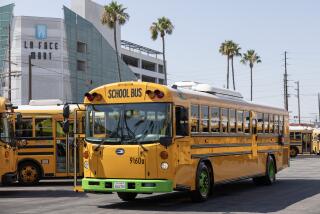L.A. adult education classes are threatened
- Share via
The students come from Peru and Korea, Malaysia and Iran. Some are teenagers, others are grandparents. And on a recent morning, as they do each day, they gathered in Marc Yablonka’s classroom in Chinatown, reading aloud from workbooks in hopes of learning enough English to get by in America.
Today’s lesson: Subordinate conjunctions.
In a chorus of accented English, the class recited their answers.
“I came to this country because I wanted to get a better job,” they said. “If I study hard, I’ll be able to improve my English.”
The students learning English at Evans Community Adult School in downtown Los Angeles improve their language skills every day, but their teacher says they still have a way to go.
Regardless, this could be their final term. And Yablonka, who has taught for 36 years, could be out of a job.
The board of the Los Angeles Unified School District is expected to take a first vote Tuesday on a worst-case $6-billion budget that would eliminate thousands of jobs, close all of the district’s adult schools and eliminate after-school and arts programs, among other reductions, according to a draft of the proposal obtained by The Times.
The budget plan could change before the meeting, and even if it is approved by the school board, a final version of the budget most likely is months away. But the nation’s second-largest school system is under pressure to eliminate a $557-million deficit for next year.
For months, teachers and staff in the targeted programs have operated amid uncertainty and fear of looming cuts. That same apprehension has affected some of the district’s most vulnerable students.
Darshanae Lampkin, 18, recently moved back to Los Angeles from Sacramento, where lackluster grades left her without enough credits to transfer to high school. Rather than attend a continuation high school or drop out, she enrolled at the learning center adjacent to Westchester High School, offered by L.A. Unified’s Division of Adult Education.
The dropout recovery program operates at 26 adult schools across the county and graduates about 1,500 students a year. Of the 297,500 students enrolled in adult education programs, nearly 52,000 students are 16 to 17 years old, the second-largest age group.
Each year at the Westchester site, coordinator Lyndal Johnson writes on the board the names of students who are on track to graduate. Of the 100 or so, the school will typically graduate about half on time. The walls of the classroom are lined with photos of recent graduates in caps and gowns, all with words of thanks to staff and encouragement for current students.
“At times, you may lose faith, but keep in mind the haters want you to fail,” wrote one. “I didn’t know I had it in me,” wrote another.
Nearby, a new student marvels at his college-level reading test score. “I want to take a picture and put it on my Facebook,” the surprised 16-year-old tells Johnson.
Lampkin takes four buses from her South Los Angeles home to attend the school every day, even though it is an independent study program and she is required to attend only once a week.
She is scheduled to graduate next January, but when she heard of the possible cuts to the program, she decided to do extra assignments to finish as quickly as possible.
Without the extra work, she fears, “I still wouldn’t be able to graduate, and I want to walk that stage,” she said. If the program is cut, she said, “it’s like, what did I work so hard for?”
A budding rapper who calls herself Bella, Lampkin wants to be a doctor, a tough goal for many graduates of the program, who rely on the low-cost vocational training and other classes offered by the district’s adult schools, said Swanzi Saunders, who coordinates dropout recovery for the program.
Because many cannot afford community college or private vocational training, they are left without many options even with a diploma, Saunders said.
“If we can’t equip them with the skills necessary to become employed, then what?” she asked. “Where will they go?”
According to the district budget proposal, the dropout recovery program might be safe from massive cuts, but all adult community schools could be closed and 1,500 teachers, administrators and other staffers from those schools could be fired. The dropout recovery program might be relocated to high schools.
The district’s early education programs could operate solely on revenue they generate. Elementary and middle school class sizes may rise and funding for GATE, the district’s program for gifted and talented students, would be cut in half, according to that plan.
Even the district’s perennially dominant Academic Decathlon program would be hit. The program, which has 63 teams and has won 17 state and 12 national championships, would lose its $850,000 budget.
For Yablonka, 62, the loss of his job could mean retiring earlier than he had planned and make paying his mortgage difficult. But for his students, who are nearly all recent immigrants, the cuts make their already difficult transition even harder.
“There will be limited places where they can learn the language that will propel them to a more solid place in our society,” he said. “Learning English is the vehicle for that.”
More to Read
Sign up for Essential California
The most important California stories and recommendations in your inbox every morning.
You may occasionally receive promotional content from the Los Angeles Times.










